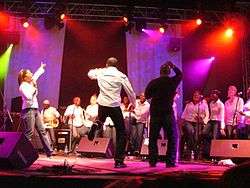London Community Gospel Choir

The London Community Gospel Choir is a successful gospel choir located in the United Kingdom.
History
The London Community Gospel Choir was founded in 1982 by the Reverend Bazil Meade with the assistance of Lawrence Johnson, Delroy Powell and John Francis.
Initially the idea was for a single concert and this was staged by a 120-strong choir before an audience of more than a thousand people. The performance was a success and what had started as a one-off event soon matured into a legacy of 25 years of travelling concerts performed worldwide.
Meade explained "We were formed from those who were passionate about their faith and were willing to take gospel music into venues that many churches at that time dared not enter."
The success of the evening at Kensington Temple led to inquiries for the choir to appear on television and the radio and at various corporate functions across the United Kingdom and Europe. The choir's debut television performance on Channel Four's 'Black On Black' proved a resounding success and led to calls from popular artists for musicians and singers to perform with them. This caused disapproval in the black church community which accused Meade and his companions of courting controversy as well as behaving in a pseudo-Christian manner. Traditionalists argued against Christians working in secular environments as well as women wearing cosmetics and jewelry. In December 2003, the Guardian described the choir as Controversial, professional, energetic, inspiring and Spirit-filled!
Meade comments, "The idea of an inter-denominational choir was something totally new to the church community. A few church leaders felt threatened by it. It took a while before we were able to convince them that we were not forming a new church and stealing their young people away! We knew this was a vision that God had given us and that inspired us to keep going despite the controversy which surrounded us,…"
The choir is often described as adaptable and flexible and as producing dynamic melodies with rich harmonies whether they are performing as an octet or as a 30-strong choir. It is known for its funk-flavoured gospel flair, swing-beat, rhythm and blues, traditional and soulful arrangements, with invigorating choreography and vocal gymnastics. Currently the choirs membership is some 45 members.
According to DrownedMadonna.com, the choir recorded a track, Living for Love, with Madonna for her upcoming album.
Memorable Performances
- in 1992, LCGC backed George Michael's performance of Queen's "Somebody To Love" and Liza Minnelli's "We Are the Champions" finale at The Freddie Mercury Tribute Concert
- LCGC performed for the former South African president Nelson Mandela during his first visit to London in July 1996; he was accompanied by Prince Charles. The choir were again called upon to sing in August 2007 as a statue of Nelson Mandela was unveiled at a ceremony in Parliament Square, London.
- In 2005 LCGC gained a worldwide audience as the backing choir turned out from head-to-toe in white for Madonna's Live 8 performance of her hit single "Like a Prayer" in Hyde Park, London.
- In 2009 the choir performed the traditional hymn "Abide with Me" at Wembley Stadium to open the FA Cup final between Chelsea and Everton.
- LCGC performed with Eric Clapton at Hyde Park in 2011 on the song "Holy Mother".
- LCGC joined Kylie Minogue at Hyde Park in 2012 on the song "Wow".
- LCGC joined Blur to perform "Tender" at the 2012 Brit Awards after picking up a special award for Outstanding Contribution to Music. The choir also featured on the original recording 1999 and also in the music video.
Recordings
The choir recorded a version of the OutKast hit "Hey Ya!" with Razorlight (the B-side to their single "Vice"), featured on Will Young's debut album From Now On, and sang on Blur's hit, "Tender". They also provided backing vocals on the Erasure self-titled album Erasure (1995) and throughout the Nick Cave and the Bad Seeds (2005) double album Abattoir Blues/The Lyre of Orpheus. They also performed in the songs "Don't Get Lost in Heaven" and "Demon Days" on the Gorillaz' Demon Days album. The choir has also recorded with Paul McCartney, Elton John, Westlife, Elkie Brooks, Tori Amos, Drumsound and Bassline Smith, Madonna and Paper Route.
The choir recorded the backing track "Circle of Life" as part of the original motion picture soundtrack to The Lion King which went on to be nominated for the Best Original Song at the 1995 Academy Awards. They also made a guest vocal appearance on Billie Piper's hit song "Honey to the Bee".
A special branch of the choir entitled 'The Edge of LCGC' released a limited-edition album entitled 'Keep Moving' as part of their yearly five night residency at the world-famous London venue the Jazz Café. The full version was proposed for release in Spring 2008.
In 2009 the choir recorded a charity single named "I Got Soul" for War Child along with other major UK stars such as Pixie Lott, N-Dubz, Tinchy Stryder and V.V Brown. On the 25th of October 2009 this single reached #10 in the UK Singles Chart giving the London Community Gospel Choir its first top ten hit.
Discography
- Fill My Cup. 1983
- Feel The Spirit. 1986
- Gospel Greats. 1990
- Hush & Listen. 1992
- Live! Inspiration & Power. 1996
- Out of Many, One Voice. 1998
- Joy To The World. 1999
- Force Behind The Power. 2001
- Negro Spirituals & Gospel Songs. 2002
- 21st Anniversary Concert. Live at Abbey Road. 2003
- Keep Moving (Limited Edition.) 2007
- Glorious. 2010
- The Best of LCGC - Celebrating 30 years. 2012
Bibliography
- Bazil Meade with Jan Greenough, A Boy, a Journey, a Dream: The story of Bazil Meade and the London Community Gospel Choir (London, Monarch, 2011).